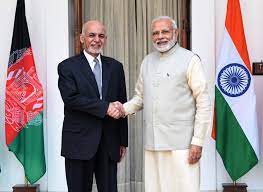Nespresso Vertuo POP+ Deluxe Coffee and Espresso Machine by Breville, Titan and Capsules, Medium and Dark Roast Coffee, Variety Pack
$125.33 (as of December 3, 2025 14:48 GMT +00:00 - More infoProduct prices and availability are accurate as of the date/time indicated and are subject to change. Any price and availability information displayed on [relevant Amazon Site(s), as applicable] at the time of purchase will apply to the purchase of this product.)Some key Afghan leaders have visited India in recent weeks, while intermittent inter-Afghan talks between the Taliban and the Afghan government have been underway in Doha since September 12.
Visitors to India include former Balkh Governor Ata Muhammad Noor, former Vice President Marshal Abdul Rashid Dostum, and the current head of the High Council for National Reconciliation in Afghanistan, Dr. Abdullah Abdullah. Senior journalist Sohasni Haider wrote in The Hindu newspaper on October 24 that the visits took place at the invitation of some Afghan leaders by the Indian government, indicating that India was re-engaging with key Afghan players. He wants to establish those with whom India has not been in touch at present.
India has been a key stakeholder in Afghanistan’s peace and stability and has invested nearly ً 2 billion in aid and reconstruction activities in the country.
Who are these Afghan leaders?
Afghan leaders who have recently visited India include key figures who have fought the Taliban. General Ata Muhammad Noor is considered a close ally of India in Afghanistan. He was in India on October 21. He is the chief executive of the Islamic Society of Afghanistan (Jamiat-e-Islami Afghanistan) and a former commander in Ahmad Shah Massoud’s Northern Alliance and fought against the Taliban in 1996.
However, he is best known in India for taking up arms to protect Indian diplomats during the 2016 attack on the Indian Consulate in Mazar-e-Sharif, the capital of Balkh Province. Earlier, Marshal Abdul Rashid Dostum had visited New Delhi in September. Only then did inter-Afghan talks begin. Dostum, an ethnic Uzbek fighter, was given martial status earlier this year under a power-sharing deal between Afghan President Ashraf Ghani and his rival, Abdullah Abdullah.
After his visit, Dr. Abdullah Abdullah also visited India. He is one of the top negotiators for international negotiations on behalf of the Afghan government. Dr. Abdullah Abdullah arrived in India on October 6 on a five-day visit. According to media reports, this is his first visit to New Delhi since the formation of a new government in Afghanistan.
The Role and Position of Pakistan
Pakistan is happy with the talks between the US and the Taliban because Pakistan has been a supporter of the Taliban and has long sought to accept the Taliban as a political player rather than a separatist group.
On the other hand, India has always said that it is committed to the reconciliation process of ‘Afghan leadership, Afghan property rights and Afghan control’. Therefore, India did not show much enthusiasm for the US-Taliban talks.
The presence of foreign troops in Afghanistan has been going on for the last 40 years. It began in 1979 with the intervention of the Soviet Union and lasted for a decade.
In 1992, with the support of Pakistan, the Mujahideen came to power in Afghanistan, but due to the infighting between the Mujahideen leaders, a civil war-like situation arose in the country.
Pakistan then began supporting the Taliban, and in 1996 the Taliban took control of Kabul. It is also the 18th anniversary of the US intervention in Afghanistan since the September 11, 2001 attacks on the US Trade Center.
Limited US military presence
The withdrawal of US troops will depend on next year’s US presidential election, rather than the situation in Afghanistan.
It may be recalled that a day before making a statement on India and Pakistan, while talking to reporters, Donald Trump had pointed out the limited presence of US troops in Afghanistan.
It has long been speculated that the Pentagon will maintain its military presence at five or six bases in Afghanistan, but the Taliban have not yet agreed.
In such a situation, the United States hopes that Pakistan can use its influence to prepare the Taliban for this proposal. It is being publicly justified that the presence of US troops will strengthen the fight against Islamic State and terrorism in the region.
But China, Iran and Russia view it with suspicion. According to these countries, the United States can use these bases to monitor them.
On the other hand, the complete withdrawal of US troops from Afghanistan would mean for Pakistan that US interest in the entire region is declining.
However, if the US maintains a limited presence of its troops, it will mean that the dependence of its troops on the Pakistani army will increase and Pakistan will also benefit from it.
What did India do in Afghanistan?
Over the past 18 years, India has played a key role in the reconstruction and development of Afghanistan. India has focused on Afghanistan in a total of three areas. These include basic social infrastructure (roads, dams, power plants, TV stations, parliament buildings), humanitarian aid (food for children in schools, health facilities) and thousands for skills development. Includes promotion of human resources to provide scholarships to Afghan youth. The development of human resources has also facilitated the training of Afghan soldiers and officers in Indian military installations. In addition, India has provided helicopters to the Afghan army as and when required. Earlier, India had rejected a proposal to send troops to international security forces in Afghanistan. Sending troops to Afghanistan meant that Indian troops would have to work under US and NATO command, which would also increase tensions with Pakistan. If the young men of the Indian Army were present in Afghanistan today, instead of peace, India would be dragged into the internal politics of Afghanistan. The goodwill towards India in every section of Afghan society is not due to the presence of the Indian Army there. This goodwill for India is because India has not supported a single party in Afghanistan’s domestic politics and has so far proved to be a reliable partner in Afghanistan’s development.



